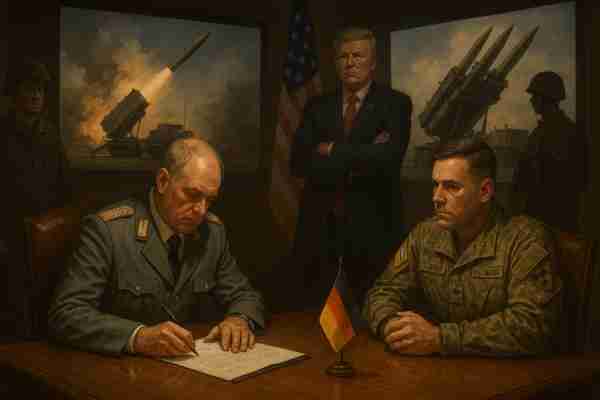In the shadow of Berlin's historic buildings, in a bunker beneath the German Ministry of Defense, Minister Boris Pistorius made his final preparations before flying to Washington. The talks ahead were not just important — they were strategic. Since Russia intensified missile attacks in eastern Ukraine, the issue of supplying Patriot systems and new long-range weapons had become urgent. Pistorius knew this trip wasn’t just diplomacy — it was a front line without gunfire. U.S. President Donald Trump, despite his unpredictability, had made it clear: the U.S. was ready to deliver Patriot systems, but the EU had to bear part of the cost. Germany, tired of diplomatic back-and-forth, decided to take the initiative. Meanwhile in Kyiv, amid nightly sirens, Ukrainian military engineers inspected debris from ballistic missiles. Senior Lieutenant Stefan Zhuravel knew that without new air defense systems, there would be no new mornings. He prayed the Washington talks would succeed. At the same time, diplomacy revived in London, Paris, and Berlin. The resurrected defense triangle — London-Paris-Berlin — was becoming a reality. Joint financing, intelligence sharing, and even speculation about a joint nuclear policy evoked the spirit of times when allies acted as one. In the Pentagon, the air conditioner roared while Hegseth, a former soldier now U.S. Secretary of Defense, studied satellite images. A signal sounded in his office: Pistorius had arrived. Handshakes, formalities — and straight to business. Discussions were tough: the number of Patriot units, delivery dates, logistics, financing. Germany proposed that if the U.S. supplied the missiles, the EU would handle infrastructure and technical support. Parallel discussions involved deploying U.S. long-range missiles in Europe. Tomahawks and hypersonic Dark Eagle systems would deter any aggression. Pistorius agreed without hesitation: Germany was ready to be the host. He knew Moscow would protest — but the alternative was worse. That evening in Kyiv, Zhuravel received a message from his commander: 'Prepare the equipment. Patriots are en route.' He clenched his fist, tears in his eyes. Weeks later, under the roar of tanks and drones, Patriot air defenses delivered via Poland were already shielding the skies over the Dnipro. German specialists trained Ukrainians, and American engineers coordinated deployment. In Berlin, the Chancellor's office discussed the next phase — integrating France and the UK into a joint missile defense system. Thus, amid explosions and alarms, a new order was taking shape — not from declarations, but from decisions, agreements, and missile batteries. In this new world, defense cooperation between Germany and the U.S. was not just a necessity — it was a shield to survive behind.
The Triangle of Defense

Published : 14.07.2025
